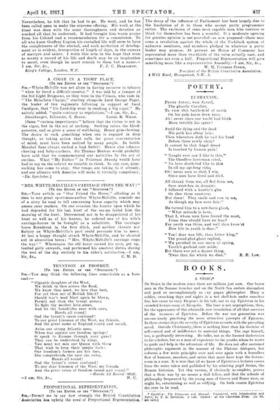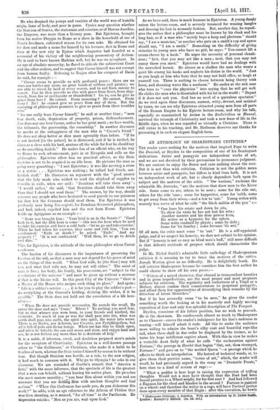B 0 0 K S .
A STOIC.*
OF Stoics in the modern sense there are millions just now. Our brave men in the Somme trenches and on the North Sea endure discomfort and peril as uncomplainingly as :iv pagan philosopher. Many a soldier, crouching days and nights in a wet shell-hole under ceaseless fire, has cause to envy Diogenes in his tub, not to say Epictetus in his crowded lecture-room at Nieopolis. The time is not unpropitious, then, for the appearance of this admirable new translation of all that survives of the iscourses of Epictetus. Before the war our generation was unconsciously practising the more attractive rrecepts of Epicurus. In these sterner days the severity of Epietetus accords with the prevailing mood. Outside Christianity, there is nothing finer than his doctrine of self-control and of indifference to material things. The sage himself, too, is profoundly interesting. He talks, not as the learned dialectician to his scholars, but as a man of experience to the youths whom he wants to guide and help in the adventure of life. He does not offer sustained philosophic argument in the manner of the Platonic dialogues, but enforces a few main principles over and over again with a boundless flow of humour, anecdote, and satire that must have kept the lecture- room in a roar. It is true that all we know of Epictctus's lectures comes from the notes taken and published by his admiring pupil Arrian, the Roman historian. Yet this version, if obviously incomplete, proves that a Stoic was by no means a dull fellow, and that the schools of philosophy frequented by the young men of Greece and Romo were, or might be, entertaining as well as edifyirlg. On both counts Epietetus des_rves to be read.
• Epietetu : The Discourse* and Manual. Translated, with Introduction and Notes,_ by I'. E. Matheson. 2 cola. oxford : at the Clarendon Item'. [ca. sti. net each-1
He who despised the pomps and vanities of the world was of huMble origin, lame of body, and poor in purse. Cynics may question whether the Stoicism of Seneca, the statesman and courtier, or of Marcus Aurelius, the Emperor, was more than a literary pose. But Epictetus, brought from his native Phrygia to Rome as a slave in the household of one of Nero's freedmen, cultivated reason for its own sake. He obtained his ire dom and made a name for himself by his lectures, first in Rome and then at the new city in Epirus which Augustus had founded as a memorial of his victory off the neighbouring promontory of Actium.
He is said to have known Hadrian well, but he was no sycophant. In an age of absolute monarchy, ho dared to ridicule the subservient Court and the office-seekers, and to suggest that Caesar himself was not exempt from human frailty. Referring to Trojan after his conquest of Dacia he said, for example :-
" Caesar seems to provide us with profound peace : there are no wars nor battles any more, no great bands of robbers and pirates ; we are able to travel by land at every season, and to sail from sunrise to sunset. Can he then provide us also with peace from fever, from ship- wreck, from fire or earthquake or thunderbolt ? Go to, can he give us peace from love ? He cannot. From mourning ? He cannot. From envy ? No ! he cannot give us peace from any of them. But the reasoning of philosophers promises to give us peace from these troubles also."
" No ono really fears Caesar himself," he said at another time ; " men fear death, exile, deprivation of property, prison, disfranchisement. Nor does any one love Caesar, unless he has great merit ; we love wealth,
• tho tribunate, the proctorship, the consulship." In another discourse he mocks at the unhappiness of the man who is " Caesar's friend." He does not Bleep better or dine more agreeably than before. "If he is not invited [to the palace], he is distressed, and if he is invited, he dines as a slave with his lord, anxious all the while for fear ho should say or do something foolish." He makes fun of an official who, on his way to Rome to seek advancement., puts in at Nicopolis and calls on the philosopher. Epictetus offers him no practical advice, as the Stoic doctrine is not to be acquired in an idle hour. He pictures the man as going away grumbling : " I met Epictetus ; it was like meeting a stone or a statue. . . . Epictetus was nothing ; he talked bad Greek, out. landish stuff." He illustrates an argument with the " good answer that the lady made who wished to send the shipload of supplies to Cratilla in exile, when one said : Domitian will take them away' ' I would rather,' she said, that Domitian should take them away than that I should not send them.' " The answer, by the way, should reassure any people who have hesitated to send parcels to our prisoners for fear lest the Germans should steal them. For Epictetus it was perilously near being lese-majesle, for Domitian distrusted philosophers, and had, indeed, cipelled him and the rest from Rome. Epictetus holds up Agrippinus as an example :— " News was brought him : Your 'trial is on in the Senate ! " Good luck to it, but the fifth hour is come '—this was the hour when he used to take his exercise and have a cold bath—' let us go and take exercise.' When ho had taken his exercise, they came and told him, You are condemned.' Exile or death ? ' ho asked. ' Exile." And my property ? " It is not confiscated.' Well then, let us go to Aricia and dine.' "
This, for Epictetus, is the attitude of the true philosopher whom Caesar condemns.
The burden of his discourses is the importance of preserving the ficedom of the will, so that a man may not depend for his peace of mind on the things of this world. " What God wills, he [the Stoic] may will too, and what God wills not, he may not will either." The mind of marl is free ; his body, his family, his possessions, are " subject to the :evolutions of the universe " and must be given up without a murmur if that is the Divine will. In this great City of the Universe " there is a Master of the House who assigns each thing its place." And again: Life is a soldier's service . . . it is for you to play the soldier's part— do everything at the General's bidding, divining His wishes, if it be possible." The Stoic does not hold out the consolation of a life here- after :-- " When Ho does not provide necessaries, He sounds the recall, He opens the door and says . Come.' Where ? To nothing you need fear, but to that whence you were born, to your friends and kindred, the elements. So much of you as was tire shall pass into fire, what was earth shall pass into earth, the spirit into spirit, the water into water. There is no Hades, nor Acheron, nor Coutes, nor Pyriphlegethon, but all is full of gods and divine beings. When one has this to think upon, and when he beholds the sun and moon and stars, and enjoys land and sea, he is not forlorn any more than he is destitute of help."
It is a noble, if inhuman, creed, and doubtless prepared men's ,minds for the reception of Christianity. Epictetus in a well-known passage refers to " tho Galilaeans," or Christians, who make it a habit to be fearless of men, whereas the Stoic trained himself by reason to be without' fear. But though Stoicism was hostile, as a rule, to the new religion, it had much in common with it. Why go to Olympia ? he asks in one discourse. We are reminded of Goethe's remark that " America is here," with the samo inference, that the spectacle of life is the greatest that a man can behold, without leaving his native place. He preaches the most austere morality ; " you bear Him about within you and are unaware that you are defilirig Him with unclean thoughts and foul actions." "When this Craftsman has made you, do you dishonour His work ?" he adds, with an apt reference to the Athena of Phidias that was then standing, as it seemed, "for all time" in the Parthenon. He deprecates suicide " Men as you arc, wait upon God."
As we have said, there is much humour in Epictetus. .A young dandy enters the lecture-room, and is severely trounced for wearing bangles and dressing his hair in womanly fashion. But, another day, he repudi- ates the notion that a philosopher must be known by his cloak and his long hair, as if a man who " merely buys a harp and plectrum " should say, " I am a musician," or another who puts on a smith's cap and apron should say, " I am a smith." Remarking on the difficulty of giving stimulus to young men who have no grit, he says: " You cannot lift a cream-cheese by a hook." He urges the necessity of personal cleanli- ness ; " first, that you may act like a man ; next, that you may not annoy those you meet." Epictetus would have had no dealings with the unwashed hermit. He abuses as a skulker the man who wants a quiet life among his books and neglects his duties in the world. " Just as you laugh at him who fears that he may not hold office, so laugh at yourself too. There is nothing to choose between being thirsty with fever, and shunning water like a madman." Ho smiles at the sick man who tries to " coax the physician " into saying that he will get well He chides the man who is dissatisfied with his lot in the world : " Depart if it does not suit you. God has no need of a querulous spectator." As we read again these discourses, earnest, witty, devout, and satirical by turns, we can see why Epictetus attracted young men from all parts of the Roman Empire to his Epirote lecture-room, and why his talk, especially as summarized by Arrian in the Eneheiridion or karma, survived the triumph of Christianity and took a new lease of life in the Middle Ages, when he was regarded as virtually a Christian. There is still virtue in his teaching, and Mr. Matheson deserves our thanks for presenting it in such an elegant English form.



























 Previous page
Previous page